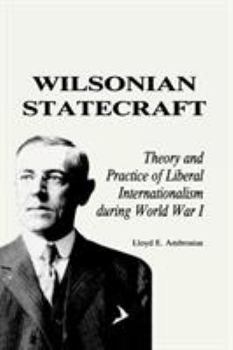Wilsonian Statecraft: Theory and Practice of Liberal Internationalism During World War I (America in the Modern World)
Select Format
Select Condition 
Book Overview
To find more information about Rowman and Littlefield titles, please visit www.rowmanlittlefield.com.
Format:Paperback
Language:English
ISBN:0842023941
ISBN13:9780842023948
Release Date:September 1991
Publisher:Globe Pequot Publishing Group Inc/Bloomsbury
Length:190 Pages
Weight:1.25 lbs.
Dimensions:0.6" x 6.0" x 9.0"
Customer Reviews
1 rating
a great companion book that details Wilson's role and intent in the field of international relations
Published by Thriftbooks.com User , 14 years ago
Lloyd E. Ambrosius.Wilsonian Statecraft: Theory and practice of Liberal Internationalism during World War I. Roman and Littlefield Publishers, 1991. 170 pages. Woodrow Wilson was a president on the heels of two very different methods of international governance, from Roosevelt's "walk softly and carry a big stick" militaristic expansionism to Taft's "dollar diplomacy" economic interests, Wilson would plot his international policymaking by what he felt was right, oftentimes with mixed results. Wilson is often credited with the creation of new ways to conduct foreign policy, as seen in Haiti where Wilson would "show them [Haitians] to elect good men". This new method of diplomacy often led to unforeseen complications as in Latin America, specifically in relations to Mexico and Haiti. Wilson was a new type of President, a former professor and lifelong idealist, Wilson championed "proper" democracy around the globe. With the dawn of World War I, Wilson saw his opportunity to be the champion of peace and democracy. It is this aim that Ambrosius largely focuses on in his book, and contends that "there was a dissonance between his American ideals and European realities."(p. ix). Ambrosius approaches his subject matter in an intellectual manner focused on Wilson's actions in the international policy sphere. It is in this realm that the author largely focuses on. The author credits the shaping of this critique by such writers as Morgenthau, Kennan and Niebuhr, showing the authors strong focus on the shaping of international affairs policy focused through the prism of realism. As can be seen by the author's influences, this is a book strongly focused in the theory of international affairs and is not for those with a casual interest in Wilson or his policies. It is this point that this book finds its niche, as its focus on affairs in Europe and the United States as matters of policy makes it unique in the large market of books on World War I and Wilson himself. While perhaps not as easily read as John Cooper's Woodrow Wilson: A Biography, this book is intended to lay out the foundations of Wilsonian international liberalism and its consequences and realities. Ambrosius begins the book explaining Wilson's particular new breed of presidency, referring to it as "liberal idealism and shrewd practicality" (p. 1) as characterizing words for his navigation during the onset of World War I. Wilson saw the United States as the "vanguard of the future" and wanted to extend the ideals of liberty and democracy over the globe. Ambrosius refers to a new dawn of American expansionism; new pressures within the government had emerged to bring the US onto the world political stage. Military and economic expansion had been the driving forces behind previous administrations; with Wilson's ideas the new driving force would be to spread the ideals of America in governance and justice. Isolationism had fallen from favor, and Wilson was eager to exercise America's new found ent






